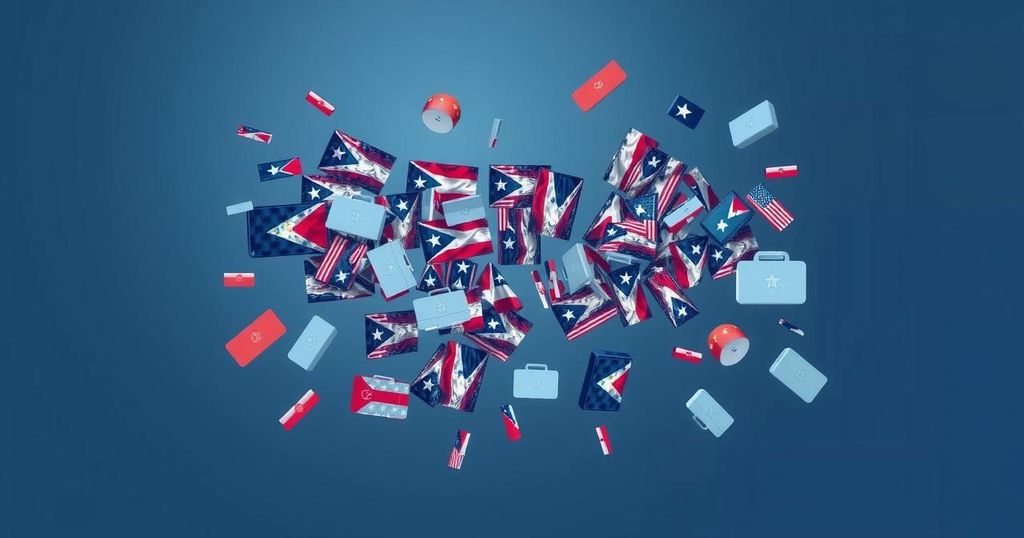Puerto Rico’s current general elections may be historic, with Jenniffer González vying for a third consecutive term for the New Progressive Party, while Juan Dalmau seeks to win as an independent candidate. Voter turnout is high, reflecting citizens’ desire for change amid socio-economic challenges. The election also includes a nonbinding referendum on Puerto Rico’s political status, which has significant implications for the territory’s future.
Puerto Rico is currently conducting general elections that hold the potential to be transformative, regardless of the outcome for the leading gubernatorial candidates. Should Jenniffer González of the New Progressive Party, which advocates for statehood, prevail, it will signify the first instance in history that this party secures three consecutive terms in governance. Conversely, if Juan Dalmau of the Puerto Rican Independence Party and Citizen Victory Movement is victorious, it will represent a groundbreaking triumph for an independent candidate outside the traditional political framework that has predominated Puerto Rican politics for many years. The election has seen a notable shift in voter engagement, with individuals standing in lengthy lines, even amid inclement weather. Voter sentiments reflect a yearning for change, highlighting dissatisfaction with the chronic issues such as frequent power outages and a scarcity of affordable housing. The traditional bipartisanship of the New Progressive Party and the Popular Democratic Party, which previously garnered over 90% of votes, appears to be waning as newer parties gain traction in the wake of economic and political challenges. Among the electorate is an array of voters, including first-time participants and celebrities like reggaetón artist Bad Bunny, who have voiced their support for candidates promoting change. Remarkably, the election process is anticipated to experience delays in results, reminiscent of the 2020 elections, attributed to the extensive counting of early and absentee votes amid complaints of electoral irregularities. In an additional aspect of the election, voters are being asked to consider Puerto Rico’s political status through a nonbinding referendum. The options include statehood, independence, and independence with free association. This referendum is crucial, as it reflects the ongoing discourse surrounding Puerto Rico’s relationship with the United States, yet any change still necessitates approval from the U.S. Congress. Furthermore, Puerto Ricans have the opportunity to symbolically cast votes for presidential candidates, although they cannot participate in actual U.S. presidential elections due to their status as a territory. Approximately two million individuals are eligible to cast their votes in this landmark election, though recent trends indicate a challenge with voter turnout and engagement.
The general elections in Puerto Rico represent not only a pivotal moment for the island’s political landscape but also a significant event within the broader context of Puerto Rican governance and its relationship with the United States. Historically dominated by the New Progressive Party and the Popular Democratic Party, the emergence of new political movements signals a potential shift in voter alignment and priorities. This election serves as a litmus test for public sentiment and political aspirations on the island, especially regarding their status as a U.S. territory. The referendum regarding political status further emphasizes the ongoing debate about Puerto Rico’s future, highlighting the disparity in treatment of territories compared to states regarding federal programs and representation.
The ongoing general elections in Puerto Rico are poised to be historic, reflecting both the changing political dynamics on the island and the desire for reform among its residents. Whether Jenniffer González secures a third consecutive term or Juan Dalmau breaks the traditional party mold, the results will undoubtedly influence the political climate in Puerto Rico for years to come. Voters are not only casting ballots for candidates but also making critical decisions regarding their preferred political status in relation to the United States. With significant potential for voter engagement and the backdrop of pressing societal issues, these elections could mark a new chapter in Puerto Rican history.
Original Source: apnews.com






